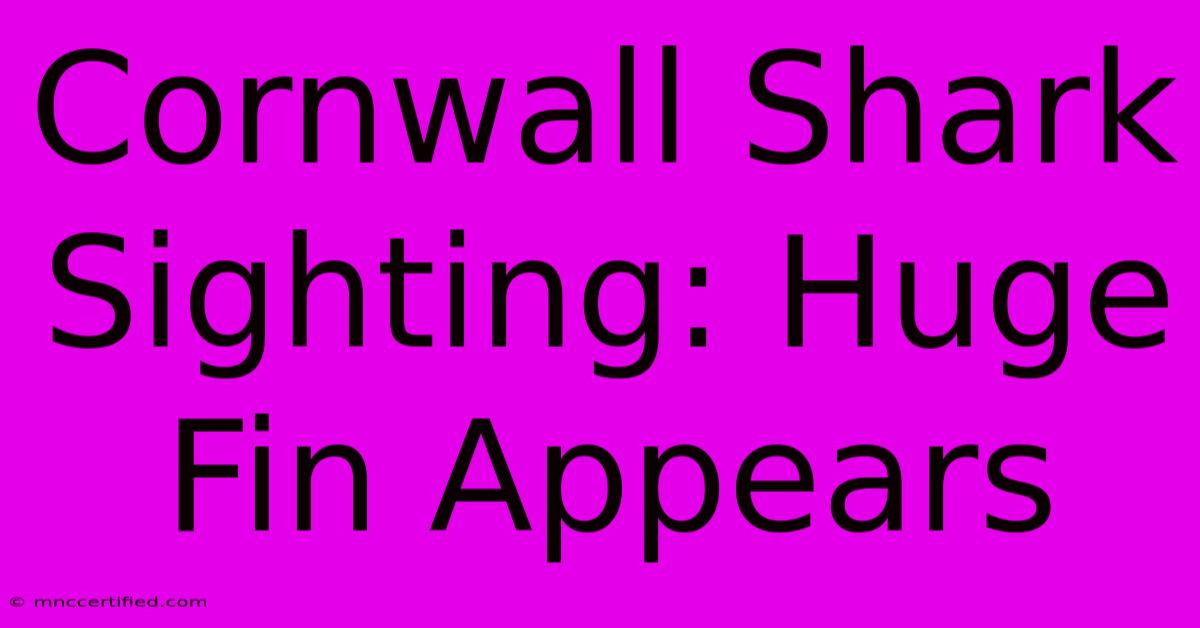Cornwall Shark Sighting: Huge Fin Appears

Table of Contents
Cornwall Shark Sighting: Huge Fin Appears – Is it a Great White?
Cornwall, a stunning coastal region in the southwest of England, recently experienced a surge of excitement – and perhaps a touch of fear – with the reported sighting of a massive shark fin. The incident, which quickly spread across social media and news outlets, has reignited the debate about shark populations in British waters and sparked considerable interest in local marine wildlife. This article delves into the details of the sighting, explores the potential species involved, and discusses the importance of responsible reporting and conservation efforts.
The Cornwall Shark Sighting: What Happened?
On [Insert Date of Sighting], several witnesses reported seeing a large fin cutting through the water near [Insert Location – be specific, e.g., Polzeath Beach]. Descriptions varied, but the common thread was the substantial size of the fin, leading many to speculate about the possibility of a great white shark. Photographs and videos, while often blurry or distant, fueled online speculation and intensified media coverage. The incident led to temporary beach closures in some areas as a precautionary measure, causing understandable concern among beachgoers and local residents.
Eyewitness Accounts: A Mixture of Excitement and Caution
Eyewitnesses described the fin as "enormous" and "significantly larger than anything they'd seen before." This fueled immediate speculation on social media, with many users sharing their theories and concerns. The lack of high-quality photographic or video evidence, however, made definitive species identification extremely challenging. Experts emphasized the need for clear, verifiable evidence before drawing firm conclusions.
Identifying the Mystery Shark: Great White or Other Species?
While the initial reaction pointed towards a great white shark ( Carcharodon carcharias), given the size of the reported fin, it's crucial to avoid jumping to conclusions. Several other shark species inhabit British waters, some of which could potentially possess a similarly large dorsal fin. These include basking sharks (Cetorhinus maximus), which are filter feeders and pose no threat to humans, and porbeagle sharks (Lamna nasus), which, while capable of reaching significant sizes, are less likely to be seen near the shore.
The Importance of Scientific Verification
It's vital to emphasize the importance of relying on verified information from marine biologists and other experts. Speculation without concrete evidence can lead to unnecessary fear and potentially damage the reputation of specific shark species. Scientists require high-quality visual data, measurements, and other information to accurately identify the shark.
Shark Conservation and Responsible Reporting
The Cornwall shark sighting highlights the importance of shark conservation and responsible reporting. Sharks are vital to the health of our oceans, playing a crucial role in maintaining the balance of marine ecosystems. However, many shark populations are facing threats from overfishing, habitat destruction, and climate change.
How to Report a Shark Sighting Responsibly:
- Take clear photos or videos if possible. Try to capture the shark from multiple angles.
- Note the location, date, and time of the sighting. Be as precise as possible.
- Report the sighting to local authorities or marine wildlife organizations. This helps experts monitor shark activity and assess potential risks.
- Avoid spreading misinformation or unsubstantiated claims. Stick to factual observations and verified information.
The Future of Shark Sightings in Cornwall
While this recent sighting has generated considerable media attention, it's essential to maintain a balanced perspective. Increased shark sightings in British waters might reflect a combination of factors, including improving conservation efforts, shifts in marine ecosystems, and heightened public awareness. Continued monitoring and research are crucial for understanding shark populations and ensuring their long-term survival. Responsible reporting and citizen science initiatives can play a significant role in this effort. Ultimately, understanding and protecting these magnificent creatures is crucial for the health of our oceans and the future of marine biodiversity.
Keywords: Cornwall shark sighting, huge shark fin, great white shark, basking shark, porbeagle shark, British shark, marine wildlife, Cornwall beaches, shark conservation, responsible reporting, ocean conservation, marine biodiversity.

Thank you for visiting our website wich cover about Cornwall Shark Sighting: Huge Fin Appears. We hope the information provided has been useful to you. Feel free to contact us if you have any questions or need further assistance. See you next time and dont miss to bookmark.
Featured Posts
-
Desert Radiology Insurance List
Nov 24, 2024
-
Arsenals Win Nwaneris Debut
Nov 24, 2024
-
Provident Mutual Life Insurance
Nov 24, 2024
-
Ncaa Football Watch Wake Forest Vs Miami
Nov 24, 2024
-
Kentucky Vs Texas Ewers Prediction
Nov 24, 2024